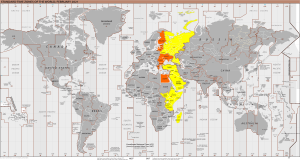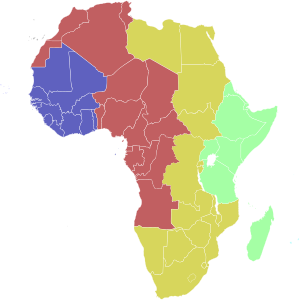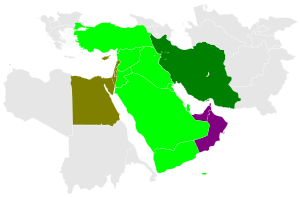UTC+03:00 is an identifier for a time offset from UTC of +03:00. In areas using this time offset, the time is three hours later than the Coordinated Universal Time (UTC). Following the ISO 8601 standard, a time with this offset would be written as, for example, 2019-02-08T23:36:06+03:00.
| UTC+03:00 | |
|---|---|
| Time zone | |

World map with the time zone highlighted
| |
| UTC offset | |
| UTC | UTC+03:00 |
| Current time | |
| 10:17, 21 June 2024 UTC+03:00 [refresh] | |
| Central meridian | |
| 45 degrees E | |
| Date-time group | |
| C | |


| Light Blue | Cape Verde Time[a] (UTC−1) |
| Blue | Greenwich Mean Time (UTC) |
| Red |
|
| Ochre |
|
| Green | East Africa Time (UTC+3) |
| Turquoise |
|


| Light Blue | Western European Time / Greenwich Mean Time (UTC) |
| Blue | Western European Time / Greenwich Mean Time (UTC) |
| Western European Summer Time / British Summer Time / Irish Standard Time (UTC+1) | |
| Red | Central European Time (UTC+1) |
| Central European Summer Time (UTC+2) | |
| Yellow | Eastern European Time / Kaliningrad Time (UTC+2) |
| Ochre | Eastern European Time (UTC+2) |
| Eastern European Summer Time (UTC+3) | |
| Green | Moscow Time / Turkey Time (UTC+3) |
| Turquoise | Armenia Time / Azerbaijan Time / Georgia Time / Samara Time (UTC+4) |

| KALT | Kaliningrad Time | UTC+2 | (MSK−1) | |
| MSK | Moscow Time | UTC+3 | (MSK±0) | |
| SAMT | Samara Time | UTC+4 | (MSK+1) | |
| YEKT | Yekaterinburg Time | UTC+5 | (MSK+2) | |
| OMST | Omsk Time | UTC+6 | (MSK+3) | |
| KRAT | Krasnoyarsk Time | UTC+7 | (MSK+4) | |
| IRKT | Irkutsk Time | UTC+8 | (MSK+5) | |
| YAKT | Yakutsk Time | UTC+9 | (MSK+6) | |
| VLAT | Vladivostok Time | UTC+10 | (MSK+7) | |
| MAGT | Magadan Time | UTC+11 | (MSK+8) | |
| PETT | Kamchatka Time | UTC+12 | (MSK+9) |
Principal cities: Istanbul, Moscow, Saint Petersburg, Doha, Riyadh, Baghdad, Nairobi, Dire Dawa, Addis Ababa, Manama, Sanaa, Aden, Minsk, Kuwait City, Asmara, Antananarivo, Kampala, Amman, Damascus
Arabia Standard Time, or AST (indicated by KSA on some Arabic TV stations), is used by some of the countries in the Middle East. As this time zone is predominantly in the equatorial region, there is no significant change in day length throughout the year, so daylight saving time is not observed. Between 1982 and 2007, Iraq observed Arabia Daylight Time (UTC+04:00) but the government abolished DST in March 2008.[5][6]
Arabia Standard Time is used by the following countries:
Most of European Russia, including Moscow, Saint Petersburg, Rostov-on-Don, Novaya Zemlya, Franz Josef Land. From October 26, 2014 Moscow and most other parts of European Russia started using UTC+03:00 again, year-round.[7] Also on September 7, 2016, Turkey started using UTC+03:00 year-round.[8][9] Besides the names mentioned above, the name "Eastern Europe Forward Time"' (EEFT) is sometimes used.
Principal cities: Kyiv, Bucharest, Athens, Jerusalem, Sofia
Using UTC+04:00:
Using UTC+03:30:
Using UTC+02:00: